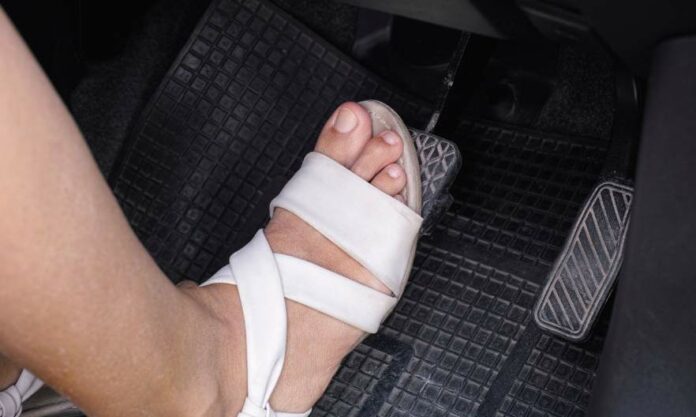Can you drive barefoot in Germany? Is it illegal to drive with flip-flops, high heels, or sandals? Driving with the right footwear is more than a matter of comfort; it’s a matter of safety and legality. People in Germany and other European countries are disputing and are not sure what type of footwear should be worn when driving a car.
We will explore these questions, debunk the myths, and give tips on how to be a safe driver.
Is it illegal to drive Barefoot in Germany?
No, It is not illegal to drive barefoot in Germany. There are no specific laws or rules that say you can’t drive without shoes on. This might be surprising to some, but that’s how the law works in Germany and many other European countries.
Here’s where things get a bit more complicated. Even though it’s legal, driving barefoot is not always safe. Some experts, like those from ADAC, have tested driving barefoot. They found that you can’t press the pedals as quickly or as hard without shoes. This means that in an emergency, you might not be able to stop the car as fast as you need to.
What Do the Experts Say?
The experts’ opinion is clear: Don’t drive barefoot in Germany. Even though you can do it, it’s better to wear shoes that fit well and give you good control over the pedals. That means shoes that won’t slip off and will let you feel the pedals properly.
According to ADAC technical experts, suitable shoes for driving must:
- Not slip off the pedals
- Provide good traction between the foot and pedals
- Avoid features like loops that could get caught
- Not be too wide to prevent accidental pressing of two pedals simultaneously
The Risks of Driving Barefoot
There are several risks associated with driving barefoot, including:
- Reduced grip on the pedals: Driving barefoot can make it difficult to maintain a firm grip on the pedals, especially in wet or cold weather. This can make it difficult to brake or accelerate quickly, which can increase the risk of an accident.
- Increased risk of slipping: If your feet are wet or sweaty, you are more likely to slip off the pedals altogether. This can be a major safety hazard, especially if you need to brake or accelerate suddenly.
- Reduced sensitivity: Driving barefoot can reduce your sensitivity to the pedals. This can make it difficult to feel the difference between the brake and accelerator pedals, which can lead to accidents.
- Distraction: Taking your shoes off while driving can be a distraction. This can take your attention away from the road and increase the risk of an accident.
Insurance Considerations: How Footwear Can Affect Claims
Driving with inappropriate footwear, such as flip-flops or sandals, can have serious repercussions, not just in terms of safety but also when it comes to insurance coverage. Let’s delve into the details of how wearing the wrong shoes can impact insurance claims:
1. Impact on Liability Insurance of the At-Fault Party
If an accident occurs and it is determined that the injured party’s choice of footwear contributed to the incident, there may be legal implications in the form of shared liability or “Mitverschulden.” Here’s what that means for insurance:
- Third-Party Liability Insurance (Haftpflichtversicherung): Typically, the damages to the injured party’s vehicle are covered by the at-fault party’s liability insurance. However, if the injured party’s choice of footwear (e.g., flip-flops) is found to have contributed to the accident, the claims may be reduced due to shared fault.
- Comprehensive Insurance (Kaskoversicherung) for the At-Fault Party: On the other hand, the at-fault party’s comprehensive insurance may resist covering the damages to their vehicle. This resistance may come in the form of claims for regress or demands for increased deductible payments from the policyholder. The underlying reason is the violation of contractually established duties (Obliegenheiten).
2. Consequences for the Injured Party’s Insurance Claims
In cases where the injured party’s footwear is deemed unsuitable, and this fact has contributed to the accident, the following may occur:
- Reduction in Claims: The liability insurance of the at-fault party may reduce the claims due to shared fault. The extent of this reduction will depend on the degree to which the injured party’s choice of footwear contributed to the accident.
- Potential Impact on Comprehensive Insurance: If the injured party has comprehensive insurance, the insurer may also examine the role of footwear in the accident. Depending on the policy’s terms and conditions, there could be implications for the payout.
3. Importance of Adhering to Safety Guidelines
While there may not be explicit legal requirements regarding footwear for driving in Germany, the consequences outlined above highlight the importance of adhering to safety guidelines. Wearing suitable footwear can prevent legal complications and ensure that insurance coverage is not compromised.
FAQs
Conclusion
So, can you drive barefoot in Germany? The simple answer is yes, but it’s not the best idea. It’s better to wear shoes that give you good control over the car. It keeps you safer, and it can also prevent problems if you ever have an accident.






